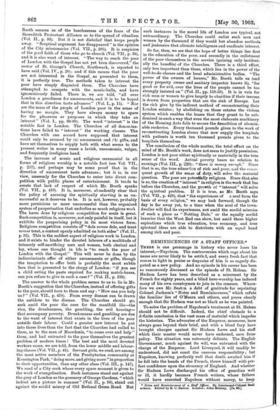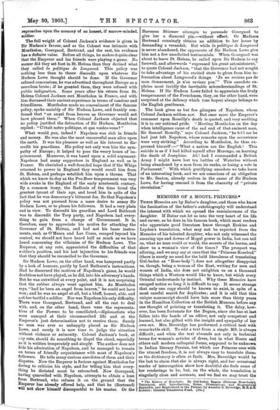REMINISCENCES OF A STAFF OFFICER.*
THERE is one personage in history who never loses his interest,—Napoleon. The controversies which rage about his name are never likely to be settled, and every fresh fact that comes to light in praise or dispraise of him is as eagerly dis- puted as a new policy. And no episode in his career has been so rancorously discussed as the episode of St. Helena. Sir Hudson Lowe has been described as a miscreant by the French for eighty years, and a blind hero-worship has induced many of his own countrymen to join in the censure. Where- fore we owe Mr. Seaten a debt of gratitude for reprinting Colonel Jackson's " Notes and Reminiscences," which refute the familiar lies of O'Meara and others, and prove clearly enough that Sir Hudson was not so black as he was painted.
To solve the problem of Napoleon's treatment at St. Helena should not be difficult. Indeed, the chief obstacle to a definite conclusion is the vast mass of material which impedes the historian. The advocates of the Emperor, moreover, have always gone beyond their brief, and with a blind fury have brought charges against Sir Hudson Lowe and his staff which their master would never have endorsed, save from policy. The situation was extremely delicate. The English Government, much against its will, was entrusted with the charge of the Emperor. Lord Liverpool, it will readily be understood, did not court the onerous responsibility ; but Napoleon, knowing perfectly well that death awaited him if he fell into the hands of the French, threw himself with per- fect confidence upon the clemency of England. And whether Sir Hudson Lowe discharged his office of guardian well or ill, it hardly becomes French writers, whose fathers would have executed Napoleon without mercy, to heap • Notes and Reminiscences of a Staff Officer. By Lieutenant-colonel Buil &anon. Edited by R. C. Seaton. London : John Murray. [7s. ed.]
reproaches upon the memory of an honest, if narrow-minded, soldier.
The full weight of Colonel Jackson's evidence is given in Sir Hudson's favour, and as the Colonel was intimate with Montholon, Gourgaud, Bertrand, and the rest, his evidence has a, definite value. Before all things, he makes it quite clear that the Emperor and his friends were playing a game. No sooner did they set foot in St. Helena than they devised what they called la politique de Longwood. This policy was nothing less than to throw discredit upon whatever Sir Hudson Lowe thought should be done. If the Governor refuted concessions, he was advertised throughout Europe as a merciless brute; if -he granted them, they were refused with public. indignation. Some years after-iris- return from St. Helena Colonel Jackson met Montholon in France, and with him discussed their ancient experience in terms of candour and friendliness. Montholon made'no concealment of the famous policy, spoke amiably of Sir Hudson Lowe, and frankly con- fessed- that " an angel from heaven as Governor would not have pleased them." When Colonel Jackson objected that no policy justified the detraction of Sir Hudson, Montholon replied: "C'etait notre politique, et que voulez-vous ? "
What would .you, indeed ? Napoleon was rich in friends and money. He was also the most resourceful man alive upon the earth. It was his pleasure as well as his interest to dis- credit his guardians. His policy not only won him the sym- pathy of Europe ; it helped to pass the weary hours of im- prisonment. Moreover, it was based upon a solid argument. Napoleon had many supporters in England as well as in France. He cherished a well-founded hope that if the Whigs returned to power in England they would recall him from St. Helena, and perhaps establish him upon a throne. That which we know to-day as the Pro-Boer temperament was very wide awake in the England of the early nineteenth century. By .a common irony, the Radicals of the time loved the greatest tyrant of their age, and loved him in spite of the fact that he was democracy's bitterest foe. So that Napoleon's policy was not pursued from a mere desire to annoy Sir Hudson Lowe, or to please his followers. It had a very plain end in view. To discredit his guardian and Lord Bathurst was to discredit the Tory party, and Napoleon had every- thing to gain from a change of Government. It is, therefore, easy to appreciate his motive for attacking the Governor of St. Helena, and had not his baser instru- ments, such as O'Meara and Las Cases, escaped beyond his control, we should not have heard half as much as we have heard concerning the villainies of Sir Hudson Lowe. The Emperor, at any rate; appreciated the difficulties of that soldiers position, and his last injunction to his friends was that they should be reconciled to the Governor.
Sir Hudson Lowe, on the other hand, was hampered partly by a lack of humour, partly by Lord Bathurst's instructions. Had he discerned the motives of Napoleon's game, he would doubtless not have played, as be did, into his adversary's hands. But he was outwitted at every point, and it is not surprising that the rubber always went against him. As Montholon says, "had he been an angel from heaven," he could not have won ; and he was no angel at all, but a bluff, honest, able, and not too tactful a soldier. Nor was Napoleon his only difficulty. There were Gourgaud, Bertrand, and all the rest to deal with, and, on the other hand, there were the representa- tives of the Powers to be conciliated,—diplomatists who were annoyed at their circumscribed life and at the Emperor's just determination not to receive them. Surely no man was ever so unhappily placed as Sir Hudson Lowe, and surely it is now time to judge the situation without violence or animosity. Colonel Jackson's book, at r.ny rate, should do something to dispel the cloud, especially as it is written temperately and simply: The author does not hide his admiration of Napoleon, and he managed to remain on terms of frienty acquaintance with most of Napoleon's followers. He tells many curious anecdotes of them and their disputes. Now the Emperor is furious against Montholon for daring to criticise his style, and for telling him that every- thing he dictated must be retrenched. Now Gourgaud, having quarrelled with Napoleon, attempts to obtain a loan from Bertrand, who refuses it on the ground that the Emperor has already offered help, and that he (Bertrand) will not sIMW himself disrespectful to his master. Or t,he
Baroness Stiirmer attempts to persuade Gourgaud to give her a diamond pin,—without effect. Or Madame Bertrand cunningly obtains an addition to her house by demanding a verandah. But while la politique de Longwood is never abandoned, the opponents of Sir Hudson Lowe give him not a few unsolicited testimonials. When Gourgaud was about to leave St. Helena, he called upon Sir Hudson to say farewell, and afterwards " expressed his great astonishment," to quote Colonel Jackson, " that the Governor had not sought to take advantage of his excited state to glean from him in- formation about Longwood's doings. 'Jo ne reviens pas de mon etonnement, je n'en reviens pas." This anecdote ex- plains most lucidly the inevitable misunderstandings of St. Helena. If Sir Hudson Lowe failed to appreciate the lively temperament of the Frenchmen, they, on the other hand, were surprised at the delicacy which (one hopes) always belongs to the English gentleman.
The book gives us but few glimpses of Napoleon, whom Colonel Jackson seldom saw. But once more the Emperor's comment upon Romilly's death is quoted, and very soothing it is to our national pride. " Meeting Montholon on the day when intelligence came of the sad end of that eminent man, Sir Samuel Romilly," says Colonel Jackson, "he told me he had just left Napoleon, whose remarks upon the occurrence were very striking." According to Montholon, he thus ex- pressed himself :—" What a nation are the English ! This suicide is as if I bad killed myself after Marengo, on learning the death of Josephine. Ah ! bad I commanded a British Army I might have lost ten battles of Waterloo without being abandoned by a man from its ranks, or losing a vote in Parliament." With which gratifying anecdote we take leave of an interesting book, and we are conscious of an obligation to Mr. Seaton, already zealous in the cause of Sir Hudson Lowe, for having rescued it from the obscurity of "private circulation."







































 Previous page
Previous page